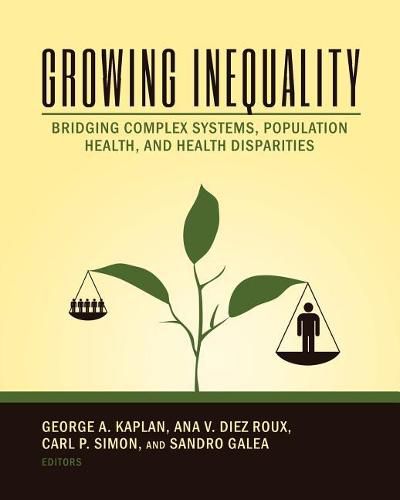Readings Newsletter
Become a Readings Member to make your shopping experience even easier.
Sign in or sign up for free!
You’re not far away from qualifying for FREE standard shipping within Australia
You’ve qualified for FREE standard shipping within Australia
The cart is loading…






This book begins the process of unraveling some of the most ‘wicked’ problems in public health.
The culmination of over five years of work by experts from a more than a dozen disciplines, this book represents a bold step forward in identifying why some populations are healthy and others are not. Describing a series of studies that apply the techniques of systems science, it shows how these tools can be used to increase our understanding of the individual, group, and institutional factors that generate a wide range of health and social problems. Most importantly, it demonstrates the utility and power of these techniques to both wisely guide our understanding and help policy makers know what works.
… an intellectually courageous undertaking. It faces up to the reality of complexity in the social determinants of health. Its achievements and its documentation of difficulties will serve as a valuable foundation for the next generation of scientists and scholars who aim to understand the determinants of health and of health disparities.
…goes beyond the search for a simplistic answer to health disparities and instead embraces the complexity. This is exactly what is needed if we are to improve population health and eliminate disparities.
It is increasingly likely that in the non-distant future that population health policy will be fully informed by a coherent computational decision-support system that integrates data, analytics, systems modeling, forecasting, and cost-effectiveness. This book marks a serious movement toward that future.
Recent review of Growing Inequality by Interdisciplinary Association of Population Health Science (IAPHS):
https: //iaphs.org/book-review-complex-systems-population-health-insights-network-inequality-complexity-health/
International Journal of Epidemiology
a master-class in how to model and how to apply complexity thinking to public health problems.
American Journal of Preventive Medicine
A stronger capacity to understand complex systems would help medicine and public health. It would help us understand the surrounding ecosystem within which A and B operate; the unrecognized factors that shape outcomes; and the smartest system strategies for health care, public health, and social policy to maximize effectiveness. If this occurs, the field may look back at the book by Kaplan et al. as a seminal work that helped launch a new literature. If not, we will continue studying trees and ignoring the forest.
American Journal of Public Health:
The editors of Growing Inequality describe new computer-based systems science tools to simulate how social determinants of health disparities are occurring in many important public health outcomes and test new possible solutions.
$9.00 standard shipping within Australia
FREE standard shipping within Australia for orders over $100.00
Express & International shipping calculated at checkout
This book begins the process of unraveling some of the most ‘wicked’ problems in public health.
The culmination of over five years of work by experts from a more than a dozen disciplines, this book represents a bold step forward in identifying why some populations are healthy and others are not. Describing a series of studies that apply the techniques of systems science, it shows how these tools can be used to increase our understanding of the individual, group, and institutional factors that generate a wide range of health and social problems. Most importantly, it demonstrates the utility and power of these techniques to both wisely guide our understanding and help policy makers know what works.
… an intellectually courageous undertaking. It faces up to the reality of complexity in the social determinants of health. Its achievements and its documentation of difficulties will serve as a valuable foundation for the next generation of scientists and scholars who aim to understand the determinants of health and of health disparities.
…goes beyond the search for a simplistic answer to health disparities and instead embraces the complexity. This is exactly what is needed if we are to improve population health and eliminate disparities.
It is increasingly likely that in the non-distant future that population health policy will be fully informed by a coherent computational decision-support system that integrates data, analytics, systems modeling, forecasting, and cost-effectiveness. This book marks a serious movement toward that future.
Recent review of Growing Inequality by Interdisciplinary Association of Population Health Science (IAPHS):
https: //iaphs.org/book-review-complex-systems-population-health-insights-network-inequality-complexity-health/
International Journal of Epidemiology
a master-class in how to model and how to apply complexity thinking to public health problems.
American Journal of Preventive Medicine
A stronger capacity to understand complex systems would help medicine and public health. It would help us understand the surrounding ecosystem within which A and B operate; the unrecognized factors that shape outcomes; and the smartest system strategies for health care, public health, and social policy to maximize effectiveness. If this occurs, the field may look back at the book by Kaplan et al. as a seminal work that helped launch a new literature. If not, we will continue studying trees and ignoring the forest.
American Journal of Public Health:
The editors of Growing Inequality describe new computer-based systems science tools to simulate how social determinants of health disparities are occurring in many important public health outcomes and test new possible solutions.